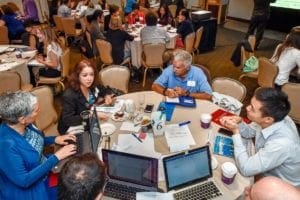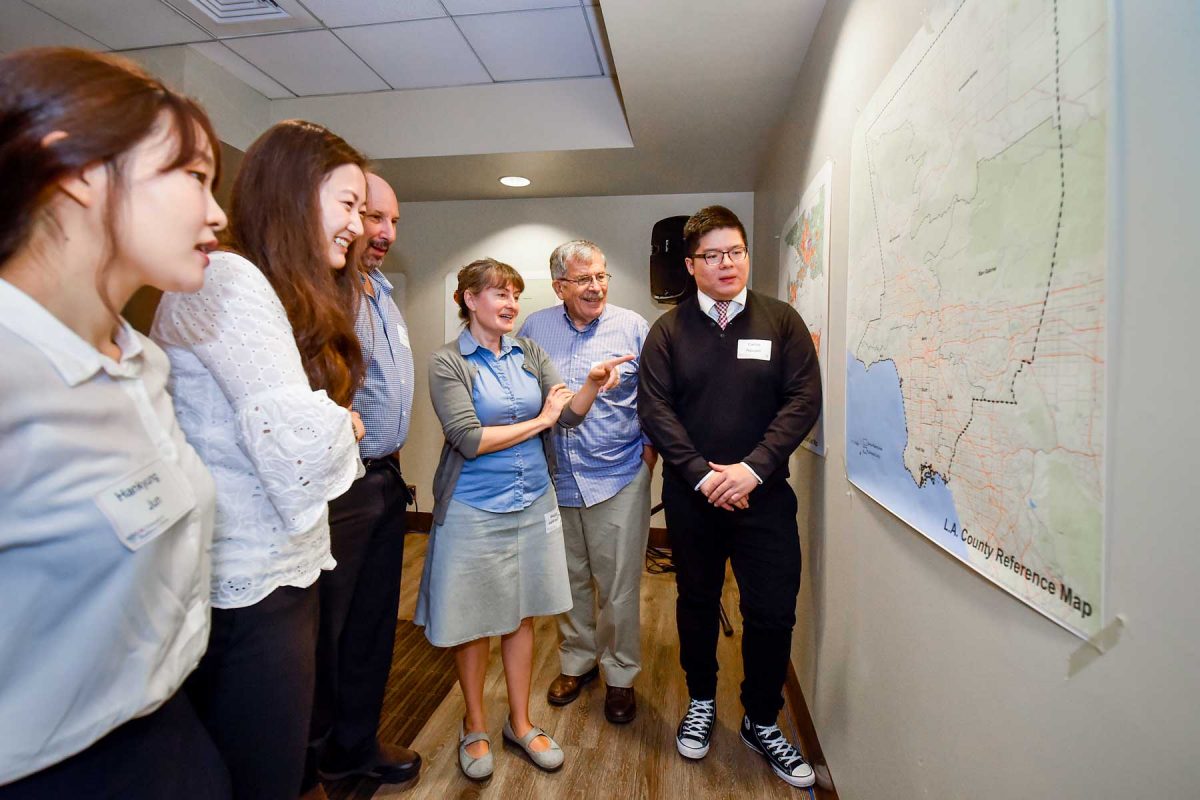City officials, professors and seniors address housing, transportation, engagement and other issues that affect the quality of life for older adults
Which bus stops have benches? What is my emergency evacuation plan? Where are free flu shots offered?
Students in the new class “Age-Friendly L.A.,” a Wicked Problems Practicum sponsored by USC Provost Michael Quick, aim to provide answers to these questions and others in the hopes of making Los Angeles a better place to grow old. Using interactive maps, they’re developing a website and mobile app to tell layered stories about aging in Los Angeles that can serve as a resource for community leaders and residents.
“L.A.’s demographic diversity and geography make it a great training ground for tackling the most difficult issues related to aging in the built environment,” said Quick, who kicked off a daylong course workshop on the University Park Campus. “This course and event is just the beginning of our efforts to engage the community and participate in the discussion of how to make a more age-friendly Los Angeles.”
Los Angeles County is home to one of the world’s largest concentrations of older adults, a population that is expected to almost double, from approximately 1.1 million in 2010 to more than 2.1 million individuals by 2030.
Meaningful actions

Participants discuss issues that affect quality of living for older Los Angeles residents. (USC Photo/Gus Ruelas)
City officials, students, professors, seniors and other stakeholders gathered for this first-of-its-kind charrette, a solution-design practice common in the field of architecture, to address housing, transportation, engagement and other measures that affect the quality of life for older adults.
“We are going to be able to use all this information and the incredible interdisciplinary work here to be able to actually think of real, meaningful actions that will make differences in the lives of Angelenos going forward,” said Ashley Stracke, director of neighborhood services for Mayor Eric Garcetti.
The goal of the semester-long course is to gather students from the USC Leonard Davis School of Gerontology, the Keck School of Medicine of USC, the USC Price School of Public Policy and the Spatial Sciences Institute at the USC Dornsife College of Letters, Arts and Sciences to examine life span aging, health and social policy problems using graphic and visual representations that policymakers, professionals and researchers can understand and use.
“We are training the next generation of leaders to think holistically about how cities can best meet the needs of their diverse aging populations,” said Caroline Cicero, an assistant professor at the USC Leonard Davis School, who is leading the course, along with Spatial Sciences Institute Associate Professor Jennifer Swift.
Life in the big city
Students aren’t just helping design a more livable city. They are actually providing directions for just how to get there. Currently few geographic visual representations, or geovisualizations of the requirements for elder-friendly communities, are available to community groups, researchers and stakeholders. The hope is that this class will change that. Students will present a website and app, featuring maps and stories of aging in Los Angeles, at a Town and Gown event on Jan. 31.
“We can harness the power of maps and geography to tell the stories of the needs of older adults in Los Angeles,” Swift said.
Participating faculty also include Annie Nguyen from the Keck School of Medicine, Darren Ruddell from the Spatial Sciences Institute, Tridib Banerjee from USC Price and Jennifer Ailshire from the USC Leonard Davis School.
The course is part of two efforts underway to help prepare for a rapidly aging society. USC Leonard Davis School Dean Pinchas Cohen is leading Quick’s university-wide Wicked Problems initiative “Ensuring Lifespan Health,” and the USC Leonard Davis School is a partner in Garcetti’s Purposeful Aging Los Angeles, a multi-agency drive to make Los Angeles the most age-friendly region in the world.
As Vale Cardenas, a student in the USC Leonard Davis School Master of Aging Services Management program, pointed out during the charette, age-friendly policies impact everyone.
“This is not just about today’s seniors,” she said. “If we are lucky, we are all going to become older adults one day.”





